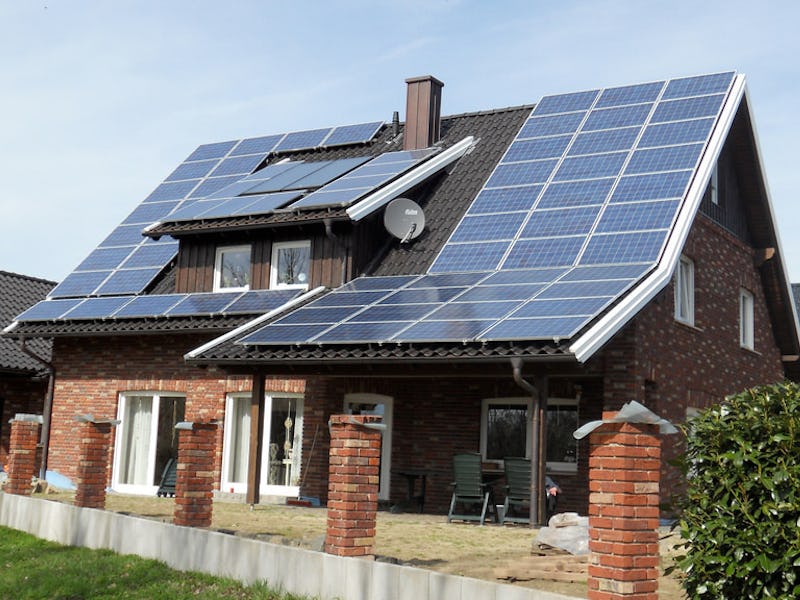How to Get Off the Grid in 5 Steps
According to the man who wrote the book on going off-grid.

Chances are good that your home is connected to the electric grid, a municipal water system, and the landline telephone network. These services, which often require monthly payments for their continued accessibility, are everywhere. But wouldn’t it be nice to become independent by severing these ties to the grid? (Don’t take that literally — you don’t actually have to try to cut a power line.)
Many people live off the grid. For some this is a religious matter, and for others it’s a decision made due to fear of a full system collapse. Yet it’s hard to know where to begin when you first start thinking about going off-grid. Thanks to advancements in modern tech, getting off the grid is easier than ever.
Inverse reached out to Nick Rosen, editor of Off-Grid.net and author of How to Live Off-Grid, for some advice on where to start.
Decide what “off-grid” means to you.
Rosen points out that “off-grid” has different meanings to different people. Some want to live by themselves. Others decide to remove themselves from the electric grid, collect their own water, and become more self-sufficient but still commute to work via public transportation. You have to decide what “off-grid” means to you before you’ll be able to achieve your goal.
“There are four basic reasons for going off the grid,” he tells Inverse. “One is that it’s all you can afford. Another is that you’re rather tired of consumer society and want a change. Another is that you think society is about to collapse and want to have a backstop. And finally, you want to help the environment.” That last category is perhaps the least common, he said, but everyone who goes off-grid ends up helping the environment whether it was their original intention or not.
Double-check your zoning laws.
One problem with going off-grid is various zoning restrictions that can require homes to have a working electric connection and running water, among other utilities. These laws are designed to ensure that people don’t buy houses or rent apartments without access to services that people who don’t live off the grid deem essential. In practice, though, they can also punish anyone who decides to live differently.
“The thing I think is most underappreciated [about going off-grid] is many, many more people would be living this way if it wasn’t for the zoning obstacle,” Rosen said. “If you could just buy a field, move in, and live there and start growing your own food, cannabis, or cash crop of any sort, there’d be far more people doing it. But zoning does prohibit that from happening.” Check your own zoning laws.
Buy some land, or an off-grid house.
Getting off the grid is far easier if you own land than if you rent an apartment. Building a home might not seem that cheap, but Rosen estimated that an off-grid home could cost $25,000 to build, including the price of the land on which it sits. A house that’s already off the grid (either intentionally or not) is also much cheaper than a comparable property with working electricity and running water.
“When I started my interest in living off the grid, it was because I had bought a small place that was off the grid, although I didn’t know it was called that at the time,” Rosen told Inverse. The property was a shepherd’s hut in Spain that cost $7,000 but was surrounded by million-dollar homes with breathtaking views. It didn’t have electricity or a water supply, but those problems were easily fixed.
Find some people to help.
Living off-grid isn’t for the faint of heart. It requires a varied skillset that few people are likely to possess — that’s why Rosen suggested anyone thinking about going off-grid ought to find other people who can complement their abilities. “Very few people have all of these skillsets,” he said, “except for highly decorated ex-Marine officers.” Unless you’re going off-grid specifically to avoid other people, your chances of success will be much higher if you accept help from others.
This extends beyond the home, too. Rosen explains that many people who go off-grid commute to work, use public libraries to access the internet, and so forth. Living off-grid is not the same as becoming a hermit; building a community and remaining part of society are both possible even if you don’t use the electric grid.
Put up some solar panels.
Rosen’s $7,000 hut became more comfortable after he installed solar panels and got a reliable water supply. The first thing anyone should do — whether they’ve built their own home or want to reduce their dependence on the grid in an existing structure — when going off-grid is getting those two things sorted.
That’s become much easier as solar panel technology has advanced, which is why more people than ever use solar power. Water can be a bit more difficult — not everyone can or wants to collect rainwater — but solar panels that provide clean water could change that, too.